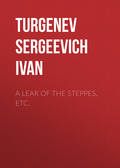
Иван Тургенев
The Diary of a Superfluous Man, and Other Stories
"You 're a dear, Naúm Ivánitch," – stammered the deeply-moved Efrém. – "The Lord will be merciful to you!"
Akím stretched out his chilled and swollen arms, and was starting for the gate…
All of a sudden Naúm "turned Jewish," as the expression is – evidently, he was sorry that he had released Akím…
"Thou hast taken an oath, look out," – he shouted after him.
Akím turned round, and surveying the house with an embracing glance, said sadly: – "Possess thou everything, forever, undisturbed … farewell."
And he stepped quietly into the street, accompanied by Efrém. Naúm waved his hand, ordered the cart to be unharnessed, and went back into the house.
"Whither away, Akím Semyónitch? Art not thou coming to my house?" – exclaimed Efrém, – perceiving that Akím turned to the right from the highway.
"No, Efrémushka, thanks," – replied Akím… "I will go and see what my wife is doing."
"Thou canst see later on… But now thou must for joy .. thou knowest …"
"No, thanks, Efrém… I 've had enough as it is. Farewell." – And Akím walked away without looking behind him.
"Eka! He has had enough as it is!" – ejaculated the astounded chanter; – "and I have taken my oath on his behalf! Well, I did n't expect this," – he added with vexation, – "after I had vouched for him. Phew!"
He remembered that he had forgotten to take his knife and pot, and returned to the inn… Naúm gave orders that his things should be delivered to him, but it never entered his head to entertain him. Thoroughly enraged and completely sober he presented himself at home.
"Well, what?" – his wife asked him; – "didst thou find him?"
"Did I find him?" – retorted Efrém; – "certainly I found him; there are thy utensils for thee."
"Akím?" – inquired his wife, with special emphasis.
Efrém nodded his head.
"Yes, Akím. But what a goose he is! I went bail for him; without me he would have been put in prison, and he never even treated me to a glass of liquor. Ulyána Feódorovna, do you, at least, show me consideration; give me just one little glass."
But Ulyána Feódorovna showed him no consideration and drove him out of her sight.
In the meantime, Akím was proceeding with quiet strides along the road which led to Lizavéta Prókhorovna's village. He had not yet been able fully to recover himself; he was all quivering inside, like a man who has but just escaped imminent death. He seemed not to believe in his freedom. With dull amazement he stared at the fields, at the sky, at the larks which were fluttering their wings in the warm air. On the previous day, at Efrém's house, he had not slept at all since dinner, although he had lain motionless on the oven; at first he had tried to drown with liquor the intolerable pain of injury within him, the anguish of wrathful, impotent indignation … but the liquor could not entirely overcome him; his heart waxed hot within him, and he began to meditate how he might pay off his malefactor… He thought of Naúm alone; Lizavéta Prókhorovna did not enter his head, and from Avdótya he mentally turned away. Toward evening, the thirst for revenge had blazed up in him to the point of crime, and he, the good-natured, weak man, with feverish impatience waited for the night, and like a wolf pouncing on its prey, he rushed forth with fire in his hand to annihilate his former home… But he had been captured … locked up… Night came. What had not he turned over in his mind during that atrocious night! It is difficult to convey in words all the tortures which he had undergone; it is all the more difficult, because these torments even in the man himself were wordless and dumb… Toward morning, before the arrival of Naúm and Efrém, Akím had felt somewhat easier in mind… "Everything is lost!"… he thought … "everything is scattered to the winds!" – and he waved his hand in despair over everything… If he had been born with an evil soul, he might have turned into a criminal at that moment; but evil was not a characteristic of Akím. Beneath the shock of the unexpected and undeserved calamity, in the reek of despair, he had made up his mind to a felonious deed; it had shaken him to the very foundations, and, having miscarried, it had left behind in him a profound weariness… Conscious of his guilt, he wrenched his heart free from all earthly things, and began to pray bitterly but zealously. At first he prayed in a whisper, at last, accidentally, perhaps, he ejaculated almost aloud: "O Lord!" – and the tears gushed from his eyes… Long did he weep, then calmed down at last… His thoughts probably would have undergone a change, had he been forced to smart for his attempt of the day before … but now he had suddenly recovered his liberty … and, half-alive, all shattered, but calm, he was on his way to an interview with his wife.
Lizavéta Prókhorovna's manor stood a verst and a half distant from her village, on the left-hand side of the country road along which Akím was walking. At the turn which led to the manor, he was on the point of pausing … but he marched past. He had decided first to go to his former cottage, to his old uncle.
Akím's tiny and already rickety cottage was situated almost at the extreme end of the village; Akím traversed the entire length of the street without encountering a single soul. The whole population was in church. Only one ailing old woman lifted her window to gaze after him, and a little girl, who had run out to the well with an empty bucket, gaped in wonder at him and also followed him with her eyes. The first person whom he met was precisely the uncle whom he was seeking. The old man had been sitting since early morning on the earthen bank outside the cottage under the windows, taking snuff, and warming himself in the sun; he was not quite well, and for that reason had not gone to church; he was on his way to see another ailing old man, a neighbour, when he suddenly espied Akím… He stopped short, let the latter come up to him, and looking him in the face, he said:
"Morning, Akímushka!"
"Morning," – replied Akím, and stepping past the old man, he entered the gate to his cottage… In the yard stood his horses, his cow, his cart; and his chickens were roaming about there also… He entered the cottage in silence. The old man followed him. Akím seated himself on the bench, and rested his clenched fists on it. The old man gazed compassionately at him, from his stand at the door.
"And where is my housewife?" – inquired Akím.
"Why, at the manor-house," – replied the old man, briskly. "She is there. They have placed thy cattle here, and thy coffers, just as they were – but she is yonder. Shall I go for her?"
Akím did not reply immediately.
"Yes, go," – he said at last.
"Ekh, uncle, uncle," – he articulated with a sigh, while the latter was taking his cap from its nail: – "dost thou remember what thou saidst to me on the eve of my wedding?"
"God's will rules all things, Akímushka."
"Dost thou remember how thou saidst to me that I was no fit mate for you peasants – and now see what a pass things have come to… I myself have become as poor as a church mouse."
"A man can't make calculations against bad people," – replied the old man; – "and as for him, the dishonest scoundrel, if any one were to teach him a good lesson, some gentleman, for instance, or any other power, – what cause would there be to fear him? The wolf recognised his prey." – And the old man put on his cap and departed.
Avdótya had but just returned from church when she was informed that her husband's uncle was inquiring for her. Up to that time she had very rarely seen him; he had not been in the habit of coming to their inn, and in general he bore the reputation of being a queer fellow; he was passionately fond of snuff, and preserved silence most of the time.
She went out to him.
"What dost thou want, Petróvitch? Has anything happened, pray?"
"Nothing has happened, Avdótya Aréfyevna; thy husband is asking for thee."
"Has he returned?"
"Yes."
"But where is he?"
"Why, in the village; he 's sitting in his cottage."
Avdótya quailed.
"Well, Petróvitch," – she asked, looking him straight in the eye, – "is he angry?"
"'T is not perceptible that he is."
Avdótya dropped her eyes.
"Well, come along," – she said, throwing on a large kerchief, and the two set out. They walked in silence until they reached the village. But when they began to draw near to the cottage, Avdótya was seized with such alarm that her knees trembled under her.
"Dear little father, Petróvitch," – she said, – "do thou go in first… Tell him that I have come."
Petróvitch entered the cottage and found Akím sitting buried in profound thought, on the selfsame spot where he had left him.
"Well," – said Akím, raising his head; – "has n't she come?"
"Yes, she has come," – replied the old man. – "She 's standing at the gate…"
"Send her hither."
The old man went out, waved his hand to Avdótya, said to her: "Go along!" and sat down again himself on the earthen bank along the cottage wall. With trepidation Avdótya opened the door, crossed the threshold and paused…
Akím looked at her.
"Well, Aréfyevna," – he began, – "what are we – thou and I – to do now?"
"Forgive me," – she whispered.
"Ekh, Aréfyevna, we are all sinful folks. What 's the use of discussing it!"
"That villain has ruined both of us," – began Avdótya in a voice which jingled and broke, and the tears streamed down her face. – "Thou must not let things stand as they are, Akím Semyónitch; thou must get the money from him. Do not spare me. I am ready to declare under oath that I lent the money to him. Lizavéta Prókhorovna had a right to sell our house, but why should he rob us?.. Get the money from him."
"I have no money to receive from him," – replied Akím, gloomily. – "He and I have settled our accounts."
Avdótya was astounded. – "How so?"
"Why, because we have. Knowest thou," – pursued Akím, and his eyes began to blaze; – "knowest thou where I spent the night? Thou dost not know? In Naúm's cellar, bound hand and foot, like a ram, that 's where I spent last night. I tried to burn down his house, and he caught me, did Naúm; he 's awfully clever! And to-day he was preparing to carry me to the town, but he pardoned me; consequently, there is no money coming to me from him… 'And when did I ever borrow any money of thee?' he will say. And am I to say: 'My wife took it out from under my floor, and carried it to thee?' – 'Thy wife is a liar,' he will say. And would n't it be a big exposure for thee, Aréfyevna? Hold thy tongue, rather, I tell thee, hold thy tongue."
"Forgive me, Semyónitch, forgive me," – whispered the thoroughly frightened Avdótya.
"That 's not the point," – replied Akím, after remaining silent for a while: – "but what are we – thou and I – to do? We no longer have a home … nor money either…"
"We 'll get along somehow, Akím Semyónitch; – we will ask Lizavéta Prókhorovna and she will help us; Kiríllovna has promised me that."
"No, Aréfyevna, thou mayest ask her for thyself along with thy Kiríllovna; thou and she are birds of a feather.43 But I 'll tell thee what: do thou stay here, with God's blessing. I shall not stay here. Luckily, we have no children, and perhaps I shall not starve alone. One person can worry along alone."
"What wilt thou do, Semyónitch – dost mean to go as carrier again?"
Akím laughed bitterly.
"A pretty carrier I would make, there 's no denying that! A fine, dashing young fellow thou hast picked out! No, Aréfyevna, that is not the same sort of business as marrying, for example; an old man is not fit for it. Only I will not remain here, that 's what; I won't have people pointing the finger at me … understand? I shall go to pray away my sins, Aréfyevna, that 's where I shall go."
"What sins hast thou, Semyónitch?" – articulated Avdótya, timidly.
"Well, wife, I know what they are."
"But in whose care wilt thou leave me, Semyónitch? How am I to live without a husband?"
"In whose care shall I leave thee? Ekh, Aréfyevna, how thou sayest that, forsooth! Much need hast thou of a husband like me, and an old man and a ruined one to boot. The idea! Thou has dispensed with me before, thou canst dispense with me hereafter also. And what property we have left thou mayest take for thyself, curse it!.."
"As thou wilt, Semyónitch," – replied Avdótya, sadly; – "thou knowest best about that."
"Exactly so. Only, don't think that I am angry with thee, Aréfyevna.
"No, what 's the use of being angry, when … I ought to have discovered how things stood earlier in the day. I myself am to blame – and I am punished." – (Akím heaved a sigh.) – "As you have made your bed, so you must lie upon it.44 I am advanced in years, and 't is time for me to be thinking of my soul. The Lord Himself has brought me to my senses. Here was I, seest thou, an old fool, who wanted to live at his ease with a young wife… No, brother – old man, first do thou pray, and beat thy brow against the earth, and be patient, and fast… And now, go, my mother. I am very tired and I will get a bit of sleep."
And Akím stretched himself out, grunting on the bench.
Avdótya started to say something, stood for a while gazing at him, then turned and went away…
"Well, did n't he thrash thee?" – Petróvitch asked her, as he sat, all bent double, on the earthen bank, when she came alongside of him. Avdótya passed him in silence. – "See there now, he did n't beat her," – said the old man to himself, as he grinned, ruffled up his hair, and took a pinch of snuff.
Akím carried out his purpose. He speedily put his petty affairs in order, and a few days after the conversation which we have transcribed, he went, already garbed for the journey, to bid farewell to his wife, who had settled for the time being in a tiny wing of the mistress's manor-house. Their leave-taking did not last long… Kiríllovna, who chanced to be on hand, advised Akím to present himself to the mistress; and he did so. Lizavéta Prókhorovna received him with a certain amount of confusion, but affably permitted him to kiss her hand, and inquired where he was intending to betake himself? He replied that he was going first to Kíeff, and thence wherever God should grant. She lauded his purpose, and dismissed him. From that time forth he rarely made his appearance at home, although he never forgot to bring his mistress a blessed bread with a particle taken out for her health…45 But, on the other hand, everywhere where devout Russians congregate, his gaunt and aged but still comely and sedate face was to be seen: at the shrine of St. Sergius, and on the White Shores, and in the Óptin Hermitage, and in distant Valaám.46 He went everywhere… This year he passed you in the ranks of the countless throng which marched in a procession of the cross behind the holy picture of the Birth-giver of God at the Korennáya Hermitage;47 next year you would find him sitting with his wallet on his back, along with other pilgrims on the porch of St. Nicholas the Wonder-Worker in Mtzensk… He made his appearance in Moscow nearly every spring.
From place to place he trudged with his quiet, unhurried but unceasing stride – 't is said that he even went to Jerusalem… He appeared to be perfectly composed and happy, and many persons talked about his piety and humility, especially those people who had chanced to converse with him.
In the meanwhile, Naúm's affairs throve exceedingly. He took hold briskly and understandingly, and, as the saying is, went to the head fast. Everybody in the neighbourhood knew by what means he had acquired possession of the inn, and they knew also that Avdótya had given him her husband's money; no one liked Naúm because of his cold and harsh character… They narrated with condemnation concerning him that one day he had replied to Akím himself, who had begged alms under his window, "God will provide," and had brought out nothing to him; but all agreed that no more lucky man than he existed; his grain throve better than his neighbours' grain; his bees swarmed more abundantly; even his hens laid more eggs; his cattle never fell ill; his horses never went lame… For a long time Avdótya could not endure to hear his name (she had accepted Lizavéta Prókhorovna's offer, and had again entered her service in the capacity of head-seamstress); but eventually, her aversion diminished somewhat; 't was said that want forced her to have recourse to him, and he gave her a hundred rubles… We shall not condemn her too severely; poverty will break any one's spirit, and the sudden revolution in her life had aged and tamed her down greatly; it is difficult to believe how quickly she lost her good looks, how she grew disheartened and low-spirited…
"And how did it all end?" – the reader will ask.
Thus: Naúm, after having conducted his business successfully for fifteen years, sold his inn on profitable terms to a petty burgher… He never would have parted with his house if the following apparently insignificant incident had not occurred: two mornings in succession his dog, as it sat in front of the windows, howled in a prolonged and mournful manner; on the second occasion he went out into the street, gazed attentively at the howling dog, shook his head, set off for the town, and that very day agreed on the price with a petty burgher, who had long been trying to purchase his inn… A week later he departed for some distant place – out of the Government, – and what think you? that very night the inn was burned to the ground; not even a kennel remained intact, and Naúm's successor was reduced to beggary. The reader can easily imagine what rumours arose in the neighbourhood concerning this conflagration… Evidently he carried his "luck" away with him, all declared… It is reported that he engaged in the grain business, and became very wealthy. But was it for long? Other equally firm pillars have fallen prone, and sooner or later a bad deed has a bad ending.
It is not worth while to say much about Lizavéta Prókhorovna: she is alive to this day, and as often happens with people of that sort, she has not changed in the least; she has not even aged much, but only seems to have grown more lean; moreover, her penuriousness has increased to an extreme degree, although it is difficult to understand for whom she is always hoarding, since she has no children, and is related to no one. In conversation she frequently alludes to Akím, and avers that ever since she discovered all his fine qualities, she has come to cherish a great respect for the Russian peasant. Kiríllovna has purchased her freedom from Lizavéta Prókhorovna for a considerable sum and has married, for love, some fair-haired young butler or other, at whose hands she endures bitter torture; Avdótya is living, as of yore, in the woman's wing of Lizavéta Prókhorovna's house, but has descended several rungs lower, dresses very poorly, almost filthily, and retains not a trace of the cityfied affectations of the fashionable maid, or the habits of a well-to-do landlady… No one takes any notice of her, and she herself is glad that they do not; old Petróvitch is dead, but Akím is still roving on pilgrimages – and God alone knows how much longer he is destined to wander!






